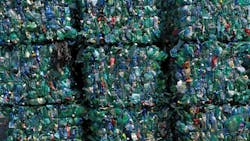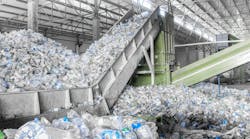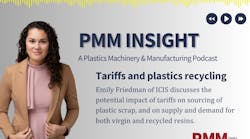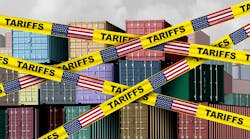Plastics processors, recyclers look for imported scrap alternatives amid tariff threats
By Bruce Geiselman
U.S. plastics processors and recyclers are scrambling to find domestic suppliers of plastic scrap as they face the prospect of significant tariffs on goods imported from Canada and Mexico, according to a recycled resin market analyst.
It appeared the United States was on the verge of a trade war with its neighbors to the north and south beginning Feb. 1, with President Donald Trump threatening 25 percent tariffs on imported goods from those countries. However, only days later, Trump and the leaders of Mexico and Canada announced the tariffs would be paused for 30 days while negotiations continued.
Regardless, plastics processors and recyclers are taking steps to find ways of avoiding those high costs should talks fail.
“Although [the tariffs] are delayed, they are not yet out of sight, and there are a lot of potential implications for plastics recyclers as well as plastics processors and converters,” said Emily Friedman, recycled plastics senior editor for ICIS, a leading chemicals and energy intelligence provider.
About a decade ago, the United States was a large exporter of plastic waste, sending much of it to China. However, global treaties and legislation curtailed that practice and increased local processing of plastic waste. The tariffs, should they go into effect, could be one step “in cementing the idea that we need to process our waste locally,” Friedman said.
“The U.S. is a net importer of plastic scrap from Canada,” Friedman told PMM. “In 2023, we imported roughly 40 percent of our overall plastic scrap from Canada and 18 percent from Mexico. These are massive trade partners across many industries, and plastics recycling is no different. What we’re seeing now is players trying to scramble to realign sourcing strategies in order to mitigate some of the effect of that high tariff.”
Plastics recyclers and processors frequently import scrap from Canada and Mexico because they are a nearby provider.
“You have to remember that scrap is regional. It’s local. Sometimes it is easier to pull from what’s closest,” she said. “Those recyclers and processors are going to have to find new sources of scrap or bale material because that 25 percent will ultimately make that material uneconomic, if I had to guess.”
Consequently, plastics processors and recyclers are looking to find new domestic feedstock. However, the amount of the supply isn’t changing.
“We’re not necessarily collecting any more recycled plastic material today than we were in December,” she said.
That could prompt plastics recyclers and processors to consider using plastics that up to now have been ignored because they have been considered less than ideal for processing. For example, clear and neutral plastics are preferred to colored plastics because they are easier to color or treat to meet a user’s design specifications. But recycling colored plastics, despite the challenges, could become a more attractive option.
“Maybe this is the apex where we switch and we go with a colored resin that can still meet our design criteria, but maybe just takes a little bit more work,” Friedman said. “It's a mixed bag. In some cases, this will exacerbate an already very difficult situation where we've seen enormous premiums for recycled resin because of a very tight supply for that very specific feedstock. But at the same time, this could shed some light on some other volumes of recycled resins in the U.S. market that people are desperate to sell.”
The impact of tariffs wouldn’t be limited to only recycled resins, Friedman said.
“Not only is the recycled plastic space directly impacted, but we’re also secondarily impacted because of virgin plastics,” she said. “The U.S. imports a great deal of polyethylene and polypropylene resin from Canada. We also import quite a bit of PET from Mexico. In 2023, 15 percent of our U.S. PET imports came from Mexico. Those sources for converters are going to be essentially cut off with this 25 percent tariff, in which case there is going to be even more pressure on domestic virgin or maybe even recycled resin as a secondary option. We could see stronger local demand from both fronts.”
Friedman shared more of her insights in a Plastics Machinery & Manufacturing podcast. You can listen to that edition of PMM Insight on our website or on your favorite podcast app.
Related content
About the Author
Bruce Geiselman
Senior Staff Reporter Bruce Geiselman covers extrusion, blow molding, additive manufacturing, automation and end markets including automotive and packaging. He also writes features, including In Other Words and Problem Solved, for Plastics Machinery & Manufacturing, Plastics Recycling and The Journal of Blow Molding. He has extensive experience in daily and magazine journalism.






